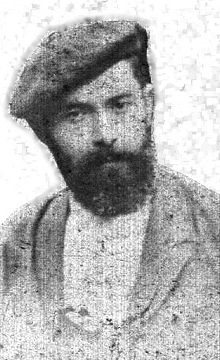Sabino Arana
| Sabino Arana | |
|---|---|

Arana in 1890
|
|
| Born | Sabino Policarpo Arana Goiri January 26, 1865 Abando, Biscay, Spain |
| Died | November 25, 1903 (aged 38) Sukarrieta, Biscay, Spain |
| Pen name | Arana ta Goiri'taŕ Sabin |
| Occupation | Writer |
| Nationality | Spanish |
| Spouse | Nicolasa de Achica-Allende Iturri (1900-1903; his death) |
| Relatives | Luis Arana (brother) |
Sabino Policarpo Arana Goiri, self-styled as Arana ta Goiri'taŕ Sabin, (January 26, 1865 – November 25, 1903), was a Basque writer. He was the founder of the Basque Nationalist Party (PNV) and father of Basque nationalism.
He died in Sukarrieta at the age of 38 after falling ill with Addison's disease during time spent in prison. He had been charged with treason for attempting to send a telegram to President Theodore Roosevelt, in which he praised the United States for helping Cuba gain independence from Spain.
One of the consequences of the First Carlist War was the substitution of the Ancien Régime Basque home rule (fueros) by a limited still relevant autonomy. A majority in Navarre and the rest of the Basque districts supported the pretender to the Spanish crown Carlos V for his support to their institutions and laws (characterized for being more liberal than elsewhere in Spain). However, they were defeated in 1839, and Navarre, Biscay, Álava and Gipuzkoa were integrated into the Spanish customs system. Basque industrialists profited from privatization of exploitations and the Spanish captive market with the iron ore and the Bessemer converter, and Biscay became "the iron California". Workers from all of Spain were attracted to the area as labourers for the burgeoning industry.
Arana was born in a jauntxo ("petty noble") family from Abando, a neighbourhood that had been recently incorporated into the city of Bilbao as the new extension for the growth of the industrial era. Abando was a Basque speaking town, but following the attitudes of the elites in the area of Bilbao during this period, Basque was not transmitted to Arana's siblings within the family. Abando and its port were at the centre of the Zamacolada uprising against attempts by the Spanish premier Manuel Godoy to recruit Basques for the Spanish army (1804), a contrafuero or breach of basic Basque legislation.
...
Wikipedia
